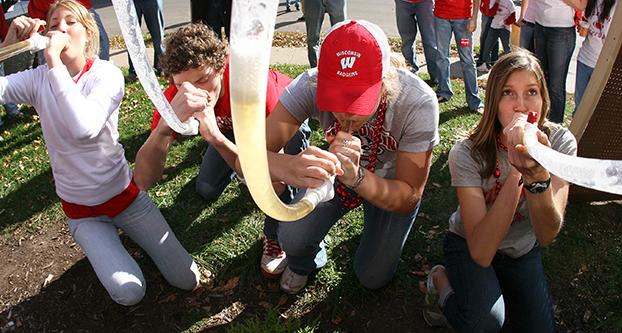The Fresno State WATCHDOG program provides education and training for students to detect the signs of alcohol poisoning and how to respond in alcohol-related situations.
The program was created by Georgianna Negron-Long, a health educator at the Student Health Center, and is in its fifth semester. Since then, 310 Fresno State students were trained to be a “WATCHDOG,” said Negron-Long.
“It’s student empowerment,” said Kathleen Yarmo, coordinator of health promotion and wellness services. “It’s not just facts students are learning but skills they can walk away with to help their fellow Bulldogs.”
“It’s nice to know students are looking out for each other,” she added.
The program adopted the acronym “MUST HELP” from the nonprofit organization Aware Awake Alive. The acronym plays a significant role in teaching how to detect signs of alcohol poisoning: mental confusion, unresponsiveness, snoring, gasping for air, throwing up, hypothermia, erratic breathing, loss of consciousness and paleness of skin.
MUST HELP are all key signs to look out for with alcohol poisoning, and a trained WATCHDOG will know ways to help, said Negron-Long. They are educated on not only what to look out for with each individual sign, but they get actual hands-on experience to enhance their lifesaving skills.
Alcohol poisoning has a huge impact within the campus community. From annual surveys conducted on campus, 80 percent of Fresno State students are practicing safe drinking behaviors more and more, said Yarmo.
There are many ways to practice safe drinking behavior, starting with pacing yourself to one standard drink every hour, alternating alcohol with drinking water, eating before and during alcohol consumption, choosing not to drink at all and by avoiding any drinking games, she said.
One standard drink is equivalent to 12 fluid ounces of beer at 5 percent alcohol by volume, 8 fluid ounces of malt liquor at 7 percent ABV, 5 fluid ounces of wine at 12 percent ABV or 1.5 fluid ounces of distilled spirits at 40 percent ABV (80 proof), according to the National Institute for Alcohol Abuse and Alcoholism.
“It’s always good to determine a pre-set number of drinks and/or only bring a certain amount of money on you to spend. Usually students tend to stick to that limit,” said Negron-Long.
Binge drinking is also something else that needs to be looked out for, said Negron-Long. A way to stay away from binge drinking is to limit intake.
In addition to the program, there is now a WATCHDOG club on campus that began this semester. All members involved have already been or will be trained on ways to react and respond to alcohol poisoning situations, CPR and ways to stand by while calling for help.




